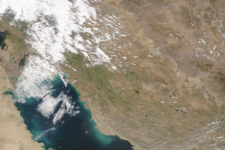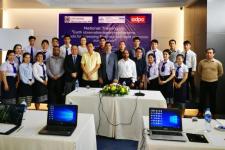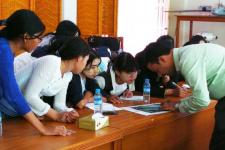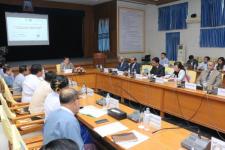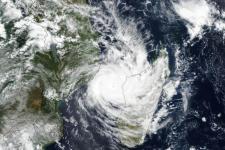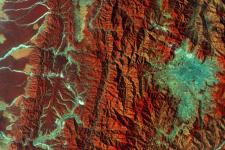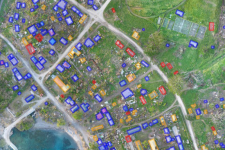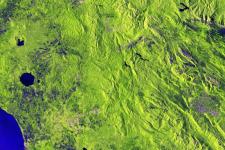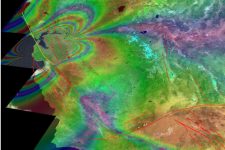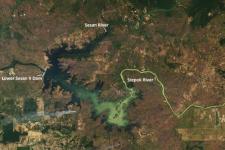We're glad to share with you the March 2019 UN-SPIDER Monthly Updates and would like to make you aware of an up-coming event that might be of interest to you: From 24 to 27 April, UNOOSA and the China National Space Administration (CNSA) are organizing the United Nations/China Forum on Space Solutions: Realizing the Sustainable Development Goals in Changsha, China. Applications for self-funded participants are open until 14 April 2019. Details are available on the UNOOSA website.
Below the updates, you'll also find an events calendar with upcoming conferences, workshops and seminars organized by the community.
Enjoy the read!
UN-SPIDER at a glance
- 31/03/2019Regional Support Offices involved: Islamic Republic of Iran Regional Support Office
The United Nations Office for Outer Space Affairs (UNOOSA), as part of the support it provides to Member States through its UN-SPIDER programme, has requested the activation of the International Charter "Space and Major Disasters" for monitoring the impact of the floods in the Islamic Republic of Iran caused by heavy rainfall in the southwestern provinces of Golestan and Mazandaran... Read more
Country/Region mentioned: - 20/03/2019Regional Support Offices involved: International Water Management Institute (IWMI)
As part of the technical advisory support it provides to countries worldwide on accessing space-based information for disaster management and emergency response, UN-SPIDER carried out an Institutional Strengthening Mission to Lao People’s Democratic Republic from 18 to 22 March 2019 upon the request of the Ministry of Science and Technology. This activity was jointly organized by the United... Read more
Country/Region mentioned: - 19/03/2019Regional Support Offices involved: International Centre for Integrated Mountain Development (ICIMOD)
As part of the technical advisory support it provides to countries worldwide, UN-SPIDER carried out an Institutional Strengthening Mission to Myanmar from 11 to 15 March 2019 upon the request of the government. This activity was jointly organized by UN-SPIDER and the United Nations Human Settlement Programme (UN-Habitat), under auspices of the Ministry of Social Welfare, Relief and Resettle... Read more
- 18/03/2019Regional Support Offices involved: International Centre for Integrated Mountain Development (ICIMOD)
The United Nations Platform for Space-based Information for Disaster Management and Emergency Response (UN-SPIDER) and the United Nations Human Settlement Programme (UN-Habitat) carried out a joint high-level advocacy workshop in Myanmar under auspices of the country’s Ministry of Social Welfare, Relief and Resettlement (MSWRR). Experts from the Centre for Space Science and Technology... Read more
- 18/03/2019
The United Nations Office for Outer Space Affairs (UNOOSA), as part of the support it provides to Member States through its UN-SPIDER programme, has requested ... Read more
Country/Region mentioned: - 04/03/2019
To support the first priority of the 'Youth 2030' strategy, namely "Engagement, Participation and Advocacy to Amplify youth voices for the promotion of a peaceful, just and sustainable world", the United Nations Office for Outer Space Affairs decided to launch the Space for Youth Competition together with the... Read more
Country/Region mentioned:
News from the community
- 29/03/2019
On 12 March, Nepal Telecommunications Authority (NTA) signed an agreement with French satellite operator Thales Alenia Space to build Nepal’s first communications satellite. The Nepalese government intends to use the satellite to provide nationwide internet access to... Read more
- 25/03/2019
The International Telecommunication Union (ITU) has published a new report about the use and opportunities of ICT and disruptive technologies for disaster risk reduction and management. The publication was announced during the third ITU Global Forum on Emergency Telecommunications, which took place from 6 to 8 March 2019 in Balaclava, Mauritius.
The study finds that... Read more
Country/Region mentioned: - 21/03/2019
A new project seeks to evaluate how satellite remote sensing and Copernicus satellite data can support reporting related to the Sendai Framework for Disaster Risk Reduction 2015-2030 (SFDRR). Cop4Sen will be implemented by the German National Coordination for the Copernicus Emergency Management Service (Copernicus EMS) under the... Read more
Satellite(s) and sensor(s) used: - 13/03/2019
Earthquakes are a major concern in increasingly populated regions, however their prediction is a difficult task. Researchers have recently made progress in the use of complex simulation and modeling techniques to better forecast the occurrences of earthquakes.
In a recent study, researchers used Gradient Boosted Regression Trees, a machine learning technique for... Read more
Country/Region mentioned: - 07/03/2019
A consortium of Norwegian institutions has used Copernicus Sentinel-1 satellite data in combination with the Interferometric Synthetic Aperture Radar (InSAR) remote sensing technique to map ground movements in the country. The Geological Survey of Norway (NGU), the Norwegian Water Resources and Energy Directorate (NVE)... Read more
Satellite(s) and sensor(s) used: - 06/03/2019
Vietnamese and American researchers joined efforts to develop a satellite-based system approach to monitor and manage transboundary flooding.
The teams from the Viet Nam National Center for Water Resources Planning and Investigation (NAWAPI) and the University of Washington co-developed and implemented an... Read more
Satellite(s) and sensor(s) used: - 06/03/2019
A team of scientists, led by the University of Bristol’s School of Earth Sciences, has used Sentinel-1 satellite imagery to analyze the ground deformation of the Agung volcano in Bali, Indonesia, and explain why it erupted in November 2017 after 50 years of dormancy.
The previous eruption of Agung in 1963 killed nearly 2,000 people and was followed by a small... Read more
Satellite(s) and sensor(s) used:Country/Region mentioned:
